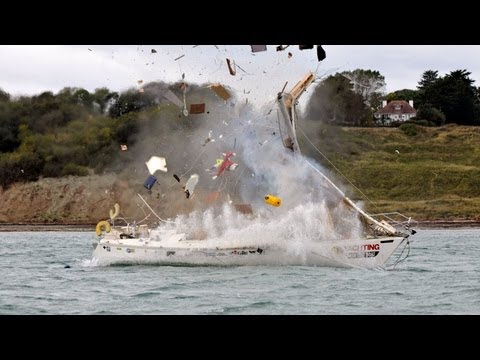Ea a fost numită „cea mai abuzată barcă din Marea Britanie”… demontată, răsturnată, găurită, incendiată… și acum a explodat. Știam că acest test final – o scurgere de gaz și o explozie de GPL – a fost cel mai periculos și potențial costisitor din seria de articole inovatoare „Crash Test Boat” a Yachting Monthly. Ar supraviețui barca? Câtă distrugere ar fi cauzată? Chiar și cu ajutorul experților în explozivi ai Marinei Regale, Lt Cdr Harry Palmer și experților în siguranța gazelor, nu am putut prezice rezultatul. Consultați numărul din decembrie al Yachting Monthly pentru a citi raportul complet. Cumpărați aplicația Crash Test Boat https://itunes.apple.com/gb/app/yachting-monthly-crash-test/id487217745?mt=8
source
Yachting Monthly’s Crash Test Boat – Explozie!

42 thoughts on “Yachting Monthly’s Crash Test Boat – Explozie!”
Comments are closed.




fire in the fuck'n hole mate!
Just a thought but why the fuck is the camera NOT on the shore?
I find it funny how of all the things that were destroyed. EXCEPT THE GODDAMB TOILET??!!!??!???!
Despite being overly long and the music… this is a most useful and edifying.. and terrifying video, which points up in the strongest possible way the necessity for testing your propane system for leaks. If you can make a soap solution for your kids to blow bubbles, you can test your propane connections !
I'm sure anything harmful was taken out of the boat before they blew it up
Soooo, what’s next for the crash test boat?
Look how difficult it was to get it to explode. Two tries with detonators. Gas is really safe if
done right.
Looks like a big waste of time and money
Quantas pessoas queria um banco desse !
As soon as the Navy and RNLI are in attendance, Chris breaks out his PFD. As soon as they're gone, it will be back to the red YM polo and slacks.
7:12 was that a dummy leg? RIP
It wasn't just the coach roof that blew off… if you look closely at the slo-mo, you can see the sides of the boat bulge out as well… I don't think that will buff out!
Trenchard.
https://assets.publishing.service.gov.uk/media/547c717be5274a429000013b/lord_trenchard.pdf
It still floats!
what the fuk was the point of this…. smh
Zzzzzzzzzzzzzzzzzzzzzzz worse than watching paint dry
There are a lot of unanswered questions raised by this. First, why didn't it explode the first time? I've been around a lot of home gas leaks, being the handy neighbor always called first. In over fifty years I've yet to be anywhere near a gas explosion. This suggests that gas can be very dangerous, but most of the time someone comes home, smells gas turns off the stove or heater, turns the gas off at the wall, or at the connection outside and then airs the place out. The protocol for being on a boat at sea with a strong gas smell is probably the same, but what if there's an open flame present? Of course you want to turn off the gas, open the hatches, put out the fire? (either an emergency fire or contained fire like a kerosene (paraffin) lamp?) But in what order? Should you first put out the fire? vent? or turn off the gas? (probably not vent first unless there's no open source of flame. The video said 6% gas I think. What if it's 15%, is that more or less likely to explode?)
What would indicate GET THE LIFE RAFT IN THE WATER NOW! (considering many are stored right on top of the cabin)?
One thing I've seen a lot of is a gas fitting that has been over tightened and will never ever seal. A new connection seems to be leaking so the DIYer gives everything a good tightening down. Tapered gas fittings if over-tightened will never ever again seal. In my experience until you've actually seen this you have no idea an extra turn can completely render the fitting unusable. Is it possible, if not recommended, to pack the tapered fitting with plumbing compound? (It's easy to say, 'just don't use the gas,until you can get it fixed' but suppose it's the only way to cook or heat the cabin and you're at sea in the high latitudes?) One thing I've learned from RVs is that you always turn the gas off at the tank before moving the vehicle. I suppose there are similar safety protocols for sailing. Your advice to carefully check gas fittings before heading out is good. One thing I've learned from experience is that even a new gas connection done correctly is at its most vulnerable when it is new. Something not considered might hit the line, or some movement might stress it. In a home this might be as simple as pushing the clothes dryer just connected back to the wall. Ideally maybe don't install a new gas connection and then head out across the Atlantic the next day.
I live on my boat I gave up propane and Open Fire so it will be better
shut the music please annoying
clickbait !
Thank you for the test. Great job. How much and which gas was used?
Lets FIX it now.. hey this was FUN.. for all the owners with diesel engines who think they are being safe with propane and gasoline stored for their outboards on their boats with no bilge blower or fume sniffers on board. It still would be fun to fix this boat and make it sail again…
Nicely done boat for sale slightly damaged from the last storm. Willing to negotiate.
The real danger of gas is not an explosion. It is the asphyxia.
It will put you to sleep and then kill you, without you realizing it.
The adventures and memories I could have had with that boat.
Boat for sale…Lightly used. Bristol condition.
FILE UNDER: "Watching paint dry"
Eh… the environment?
a young bill murray
Maybe clean up afteryourselves? amounts to littering the solent. Won't be buying YM now.
Great video. It clearly shows you how difficult actually is to get such a gas explosion on a sail boat:
– you need to seal the boat air proof like it will never be seal in the real circumstances; (you need to literally transform it to a gas chamber)
– you need to relocate the gas source from its safe, original position to the place which is the best for explosion initiation;
-you need to get rid of he original safe gas fittings and connectors;
– you need the navy explosives experts, and gas safety experts;
…Even then- despite of all your efforts – it will (maybe) work on the second attempt … but you need to be professional.
I think it's a great, educational video.
PS. you can surely die from the gas poisoning even without sealing all the gaps but the explosion it is what i would go for myself – looks more spectacular.
next episode: the refit
"We couldn't predict the outcome." Well, that's odd, because I would have predicted that a gas explosion would blow the boat up.
I'm still supportive of making up excuses to blow things up, so long as no one is hurt.
I lost a mate to a gas explosion. Southdock thames. Back in the 90s.
It blew his girl out of the companionway with severe burns and she made it. They flew him to bristol and he lasted a good few days. But he didn't make it. He was below at the time the boat blew. Solid wooden boat. Was hardly damaged.
Thanks for the video.
Hope you picked up all the plastic etc. Wouldn't want any more plastic pollution would we???
Trash in the sea. Why not on land?
Still floats and looks like the head still works. Just another fixer-upper.
Seriously, this was informative and I hope a lot of people see it.
if you were on the loo, I think you may have a chance at survival 😂
Lost debris at sea and pollution, it would have been better and with the same results to do it at sea, and then recover all the remains of the explosion . You don’t respect MARPOL as we do!
I've seen a boat catch fire and sink in minutes, this is more terrifying.
I forgot to air out my standup ski once, it pulled a vacuum released the cover and blew open enough to shoot a flame across my Lower legs, sealed areas like all marine crafts. And fumes are bad news!!